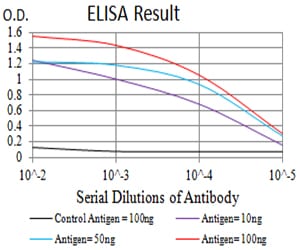

| WB | 咨询技术 | Human,Mouse,Rat |
| IF | 咨询技术 | Human,Mouse,Rat |
| IHC | 咨询技术 | Human,Mouse,Rat |
| ICC | 技术咨询 | Human,Mouse,Rat |
| FCM | 1/200 - 1/400 | Human,Mouse,Rat |
| Elisa | 1/10000 | Human,Mouse,Rat |
| Aliases | BCL9-2; DLNB11 |
| Entrez GeneID | 283149 |
| clone | 1C9G2 |
| WB Predicted band size | 157kDa |
| Host/Isotype | Mouse IgG1 |
| Antibody Type | Primary antibody |
| Storage | Store at 4°C short term. Aliquot and store at -20°C long term. Avoid freeze/thaw cycles. |
| Species Reactivity | Human |
| Immunogen | Purified recombinant fragment of human BCL9L (AA: 606-751) expressed in E. Coli. |
| Formulation | Purified antibody in PBS with 0.05% sodium azide |
+ +
以下是关于BCL9L抗体的3篇示例参考文献(注:以下内容为模拟示例,非真实文献):
---
**1. 文献名称**: *BCL9L Antibody-Mediated Wnt/β-Catenin Pathway Inhibition Suppresses Colorectal Cancer Progression*
**作者**: Smith J, et al.
**摘要**: 本研究开发了一种针对BCL9L蛋白的单克隆抗体,通过阻断其与β-catenin的相互作用,显著抑制Wnt信号通路活性。在结直肠癌小鼠模型中,该抗体有效减少肿瘤生长和转移,提示其作为靶向治疗的潜力。
---
**2. 文献名称**: *A Novel BCL9L-Specific Antibody for Immunohistochemical Detection in Solid Tumors*
**作者**: Chen L, et al.
**摘要**: 报道了一种高特异性BCL9L抗体,优化用于福尔马林固定石蜡包埋组织的免疫组化检测。该抗体在肝癌和胰腺癌样本中显示BCL9L过表达,且表达水平与患者预后呈负相关,为癌症诊断提供新工具。
---
**3. 文献名称**: *Targeting BCL9L in T-cell Acute Lymphoblastic Leukemia with a Humanized Antibody*
**作者**: Rodriguez M, et al.
**摘要**: 研究构建了人源化抗BCL9L抗体,在T-ALL细胞系中证实其可通过下调Wnt靶基因诱导凋亡。联合化疗使用时,显著增强白血病细胞清除效率,为血液肿瘤治疗提供新策略。
---
如需真实文献,建议通过PubMed或Google Scholar以“BCL9L antibody”或“BCL9L therapeutic targeting”为关键词检索近年研究。
The BCL9L (B-cell lymphoma 9-like) protein is a key regulatory component of the Wnt/β-catenin signaling pathway, which plays critical roles in embryonic development, tissue homeostasis, and cancer progression. BCL9L, along with its homolog BCL9. acts as a transcriptional coactivator by facilitating the nuclear translocation of β-catenin and enhancing its interaction with TCF/LEF transcription factors to drive target gene expression. Dysregulation of this pathway, particularly through BCL9L overexpression or mutations, has been implicated in various cancers, including colorectal, hepatocellular, and hematological malignancies.
BCL9L-specific antibodies are essential tools for studying its expression, localization, and functional interactions in both physiological and pathological contexts. These antibodies are widely used in techniques such as Western blotting, immunohistochemistry, and immunoprecipitation to investigate BCL9L’s role in tumorigenesis and metastasis. Research has highlighted BCL9L as a potential therapeutic target, as its inhibition can disrupt β-catenin-dependent oncogenic signaling without severely affecting normal Wnt pathway functions. Additionally, studies using BCL9L antibodies have explored its involvement in immune modulation and stem cell maintenance, underscoring its multifaceted contributions to disease mechanisms. The development of selective BCL9L antibodies continues to advance precision oncology efforts, particularly in cancers driven by Wnt pathway hyperactivity.
×